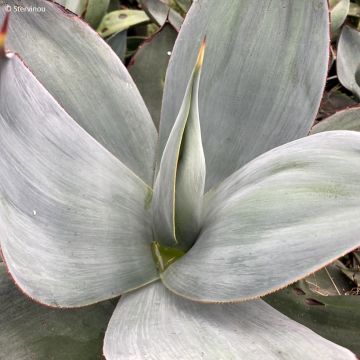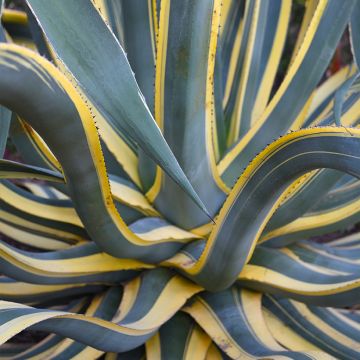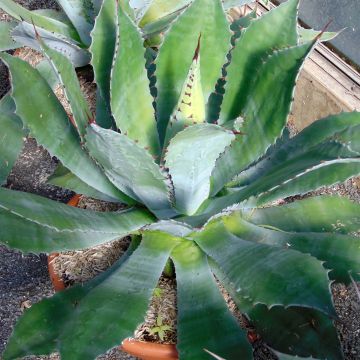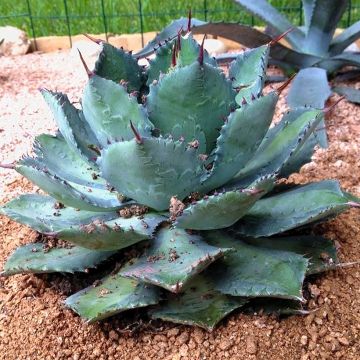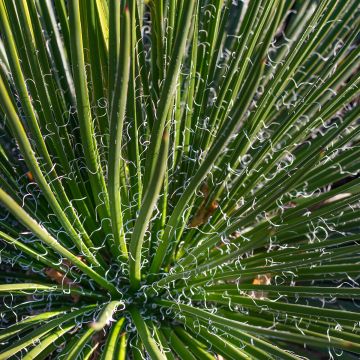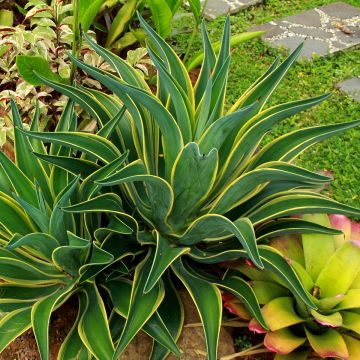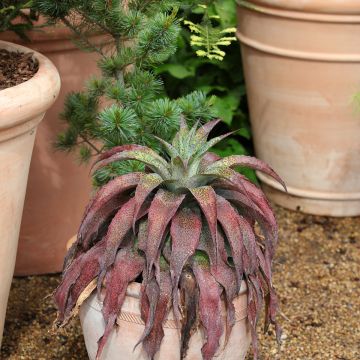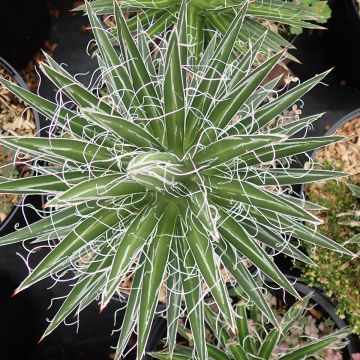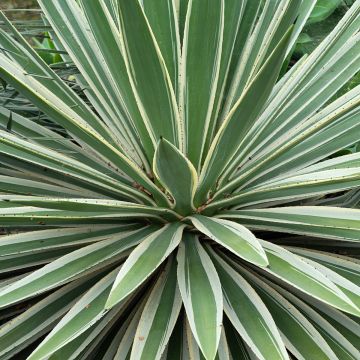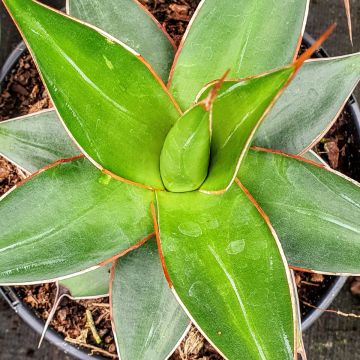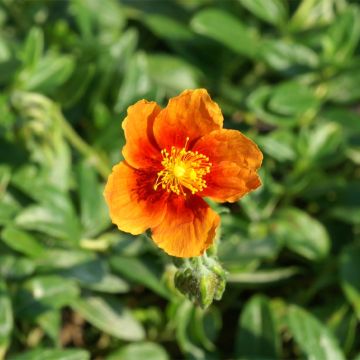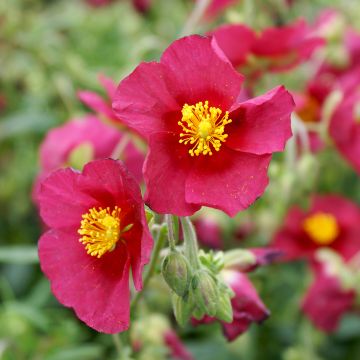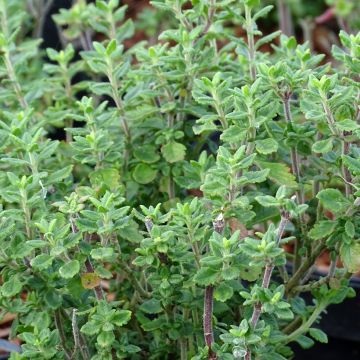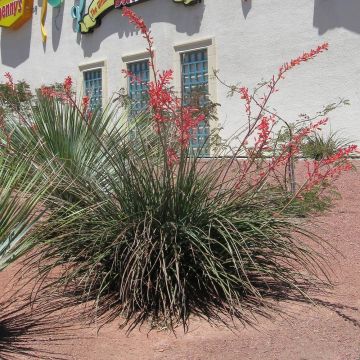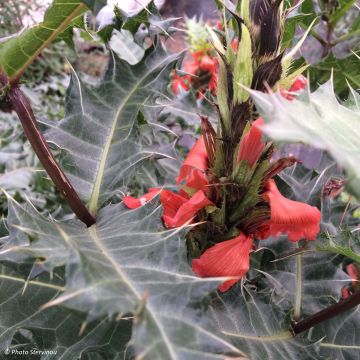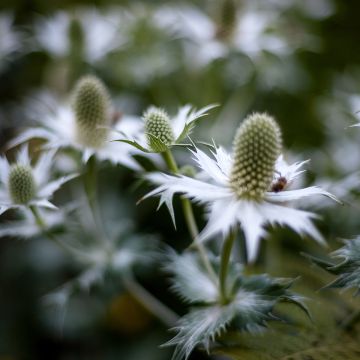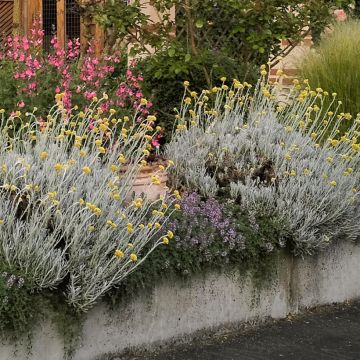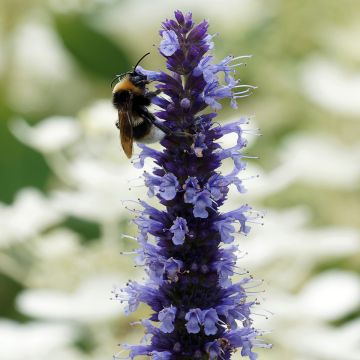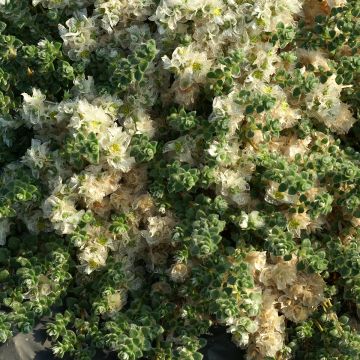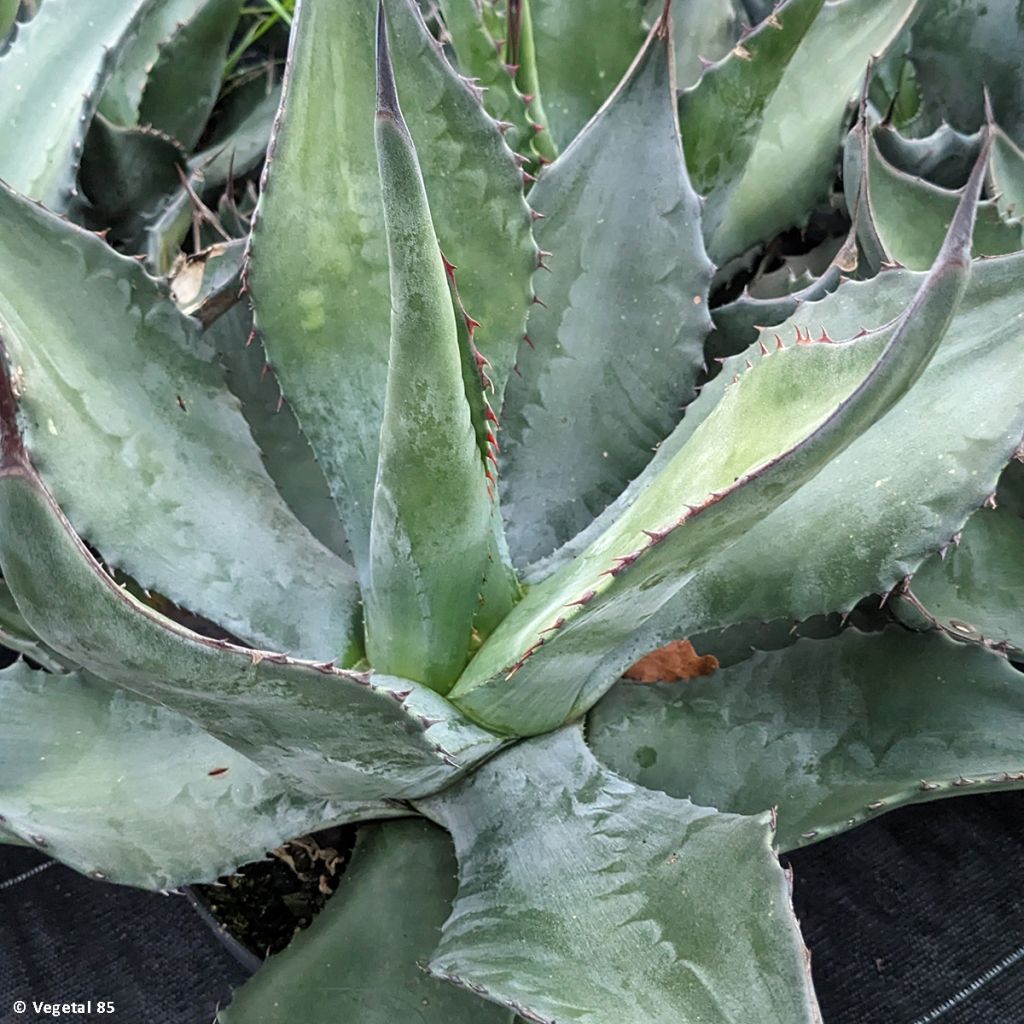

Agave salmiana
Agave salmiana
Agave salmiana
Giant Agave, Salmiana Agave, Pulque Agave
This item cannot be shipped to the selected country
Delivery charge from €5.90
More information
Schedule delivery date,
and select date in basket
This plant carries a 12 months recovery warranty
More information
We guarantee the quality of our plants for a full growing cycle, and will replace at our expense any plant that fails to recover under normal climatic and planting conditions.
From €5.90 for pickup delivery and €6.90 for home delivery
Express home delivery from €8.90.
Does this plant fit my garden?
Set up your Plantfit profile →
Description
Agave salmiana, sometimes called Salm's Agave, is one of the largest species in the genus. It produces abundant offshoots, requiring space to grow. Its rosette consists of large, slender leaves with a flexible habit, slightly undulate, and with the sharp tips curved towards the centre. These leaves are a beautiful dark green and bear spines along their length. Adult plants only flower after 15 to 25 years, producing a gigantic flower spike, after which the rosette dies. This allows the offshoots to grow in its place. Moderately hardy, it requires a sunny location and well-drained soil.
Agaves belong to the Asparagaceae family (formerly Agavaceae), which includes more than 600 species and about twenty genera, many of which are ornamental (Yucca, Cordyline, Sansevieria, Nolina). Native to Mexico, Agave salmiana grows throughout the central part of the country. This large distribution area has led to the development of several botanical subspecies, mainly Agave salmiana subsp. salmiana and A. salmiana subsp. crassispina (both with long leaves and large growth), as well as A. salmiana var. ferox, recognisable by its aggressive spines and smaller size. The crassispina subspecies is the most common form in cultivation in Europe.
Like the widely spread Agave americana, Agave salmiana is a large species. As an adult, this perennial forms a clump 2.5 to 3m (8 to 10ft) tall and 3 to 3.5m (10 to 11 ft) wide. The rosette bears a rather delicate and flexible appearance. Its large leaves are obviously rigid, but they have a supple aspect with elegant undulations. They look like cobras stretching towards the sky, with their tips curved towards the centre of the plant. These dark green leaves have powerful dark red spines in their youth, which later turn grey-brown. In old plants, the spines soften and almost disappear. The leaves take on a gutter shape, with a V-shaped section. The two rigid lateral edges join at the end of the lamina to form a long dark brown spine of 8 to 12cm (3 to 5in), which is extremely prickly. Curiously, the developing leaves leave their imprint on the leaf below, creating quite decorative patterns.
This species is primarily ornamental because of its beautiful leaves, as its flowering takes many years to occur. After 15 to 25 years, the rosette finally produces a spectacular flower spike, which can reach up to 4m (13ft) in height. This spike bears large panicles of flowers about 6 to 7cm (2 to 3in) in size, densely packed in bouquets that are quite spectacular, with a slightly greenish-yellow colour. Monocarpic, this Agave only flowers once before dying, leaving space for the offshoots at its base.
Hardier than Agave americana, Agave salmiana can withstand brief frosts down to -10°C (14°F) or even -12°C (10.4°F), provided it is planted in well-drained soil. Stagnant water is harmful to succulent plants, as it intensifies the effects of freezing. Planting on a slope facilitates water drainage. While it is demanding in terms of drainage, it is accommodating in terms of soil type. Poor and dry soil suits it perfectly.
Thriving in hot climates, this Agave salmiana is ideal for bringing life to a dry bed. Plant it alongside other plants that thrive in dry conditions, such as Yuccas, which are decorative with their slender leaves and abundant flowering. Hesperaloe parviflora, also known as Red Yucca for its magnificent coral-red flower spikes, will also make a perfect companion. Opuntias or prickly pear cacti will also work alongside this agave. Many species have excellent hardiness, such as Opuntia engelmannii var. rastrera, which can withstand frosts down to -20°C (-4°F).
Report an error about the product description
Agave salmiana in pictures
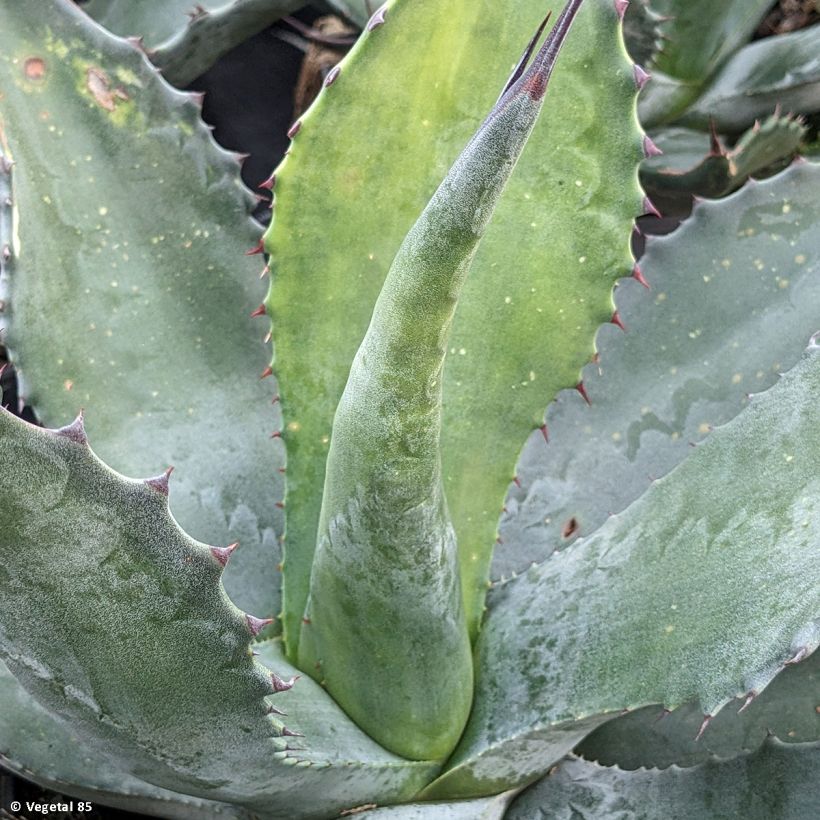

Flowering
Foliage
Plant habit
Botanical data
Agave
salmiana
Agavaceae
Giant Agave, Salmiana Agave, Pulque Agave
North America
Other Agave
Planting and care
In hot regions, plant Agave salmiana in full sun, in a scorching location, on a slope or arid embankment, in preferably poor, very rocky, limestone, sandy, and well-drained soil. This plant can tolerate brief frosts down to -10°C (14°F) in dry soil, but it does not tolerate excessive moisture well, which is common in clayey soils, combined with severe cold. As it prefers dry soils in the summer, in slightly humid climates, one can consider, for example, digging a 50 cm (20in) hole, and filling it with a mix of rocks and light soil. Plant the agave in this hole, ensuring its collar is free from stagnant water. Ideally, it should be planted on a slope, allowing water to drain and not accumulate in the rosette. A generous but spaced-out watering will suit it perfectly to help it establish itself in the first year. After that, it will manage perfectly well on its own.
This species is difficult to cultivate in pots due to its adult size.
Planting period
Intended location
Care
This item has not been reviewed yet - be the first to leave a review about it.
Mediterranean perennials
Haven't found what you were looking for?
Hardiness is the lowest winter temperature a plant can endure without suffering serious damage or even dying. However, hardiness is affected by location (a sheltered area, such as a patio), protection (winter cover) and soil type (hardiness is improved by well-drained soil).

Photo Sharing Terms & Conditions
In order to encourage gardeners to interact and share their experiences, Promesse de fleurs offers various media enabling content to be uploaded onto its Site - in particular via the ‘Photo sharing’ module.
The User agrees to refrain from:
- Posting any content that is illegal, prejudicial, insulting, racist, inciteful to hatred, revisionist, contrary to public decency, that infringes on privacy or on the privacy rights of third parties, in particular the publicity rights of persons and goods, intellectual property rights, or the right to privacy.
- Submitting content on behalf of a third party;
- Impersonate the identity of a third party and/or publish any personal information about a third party;
In general, the User undertakes to refrain from any unethical behaviour.
All Content (in particular text, comments, files, images, photos, videos, creative works, etc.), which may be subject to property or intellectual property rights, image or other private rights, shall remain the property of the User, subject to the limited rights granted by the terms of the licence granted by Promesse de fleurs as stated below. Users are at liberty to publish or not to publish such Content on the Site, notably via the ‘Photo Sharing’ facility, and accept that this Content shall be made public and freely accessible, notably on the Internet.
Users further acknowledge, undertake to have ,and guarantee that they hold all necessary rights and permissions to publish such material on the Site, in particular with regard to the legislation in force pertaining to any privacy, property, intellectual property, image, or contractual rights, or rights of any other nature. By publishing such Content on the Site, Users acknowledge accepting full liability as publishers of the Content within the meaning of the law, and grant Promesse de fleurs, free of charge, an inclusive, worldwide licence for the said Content for the entire duration of its publication, including all reproduction, representation, up/downloading, displaying, performing, transmission, and storage rights.
Users also grant permission for their name to be linked to the Content and accept that this link may not always be made available.
By engaging in posting material, Users consent to their Content becoming automatically accessible on the Internet, in particular on other sites and/or blogs and/or web pages of the Promesse de fleurs site, including in particular social pages and the Promesse de fleurs catalogue.
Users may secure the removal of entrusted content free of charge by issuing a simple request via our contact form.
The flowering period indicated on our website applies to countries and regions located in USDA zone 8 (France, the United Kingdom, Ireland, the Netherlands, etc.)
It will vary according to where you live:
- In zones 9 to 10 (Italy, Spain, Greece, etc.), flowering will occur about 2 to 4 weeks earlier.
- In zones 6 to 7 (Germany, Poland, Slovenia, and lower mountainous regions), flowering will be delayed by 2 to 3 weeks.
- In zone 5 (Central Europe, Scandinavia), blooming will be delayed by 3 to 5 weeks.
In temperate climates, pruning of spring-flowering shrubs (forsythia, spireas, etc.) should be done just after flowering.
Pruning of summer-flowering shrubs (Indian Lilac, Perovskia, etc.) can be done in winter or spring.
In cold regions as well as with frost-sensitive plants, avoid pruning too early when severe frosts may still occur.
The planting period indicated on our website applies to countries and regions located in USDA zone 8 (France, United Kingdom, Ireland, Netherlands).
It will vary according to where you live:
- In Mediterranean zones (Marseille, Madrid, Milan, etc.), autumn and winter are the best planting periods.
- In continental zones (Strasbourg, Munich, Vienna, etc.), delay planting by 2 to 3 weeks in spring and bring it forward by 2 to 4 weeks in autumn.
- In mountainous regions (the Alps, Pyrenees, Carpathians, etc.), it is best to plant in late spring (May-June) or late summer (August-September).
The harvesting period indicated on our website applies to countries and regions in USDA zone 8 (France, England, Ireland, the Netherlands).
In colder areas (Scandinavia, Poland, Austria...) fruit and vegetable harvests are likely to be delayed by 3-4 weeks.
In warmer areas (Italy, Spain, Greece, etc.), harvesting will probably take place earlier, depending on weather conditions.
The sowing periods indicated on our website apply to countries and regions within USDA Zone 8 (France, UK, Ireland, Netherlands).
In colder areas (Scandinavia, Poland, Austria...), delay any outdoor sowing by 3-4 weeks, or sow under glass.
In warmer climes (Italy, Spain, Greece, etc.), bring outdoor sowing forward by a few weeks.

































